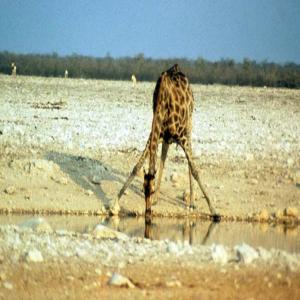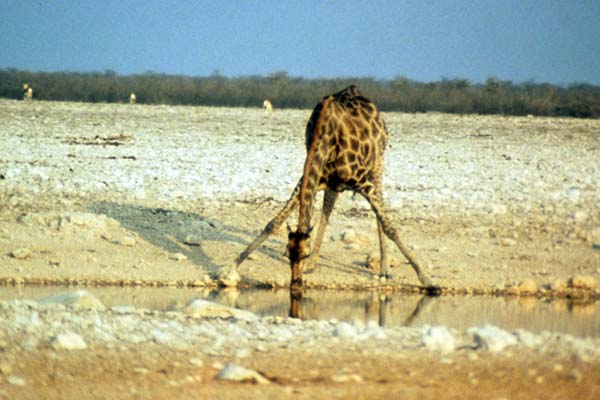Episodes

Wednesday Mar 09, 2016
Wednesday Mar 09, 2016
Go behind the scenes of a pangolin rescue with Thai Van Nguyen, founder and executive director of Save Vietnam's Wildlife, and Gillian Foster, the organization's Communications Advisor. Save Vietnam's Wildlife is the first Vietnamese NGO dedicated to saving pangolins. Pangolins are arguably the world's most trafficked mammal, with an estimated 100,000 captured each year. People hunt them for their meat and their scales, which are used in traditional Asian medicine. Vietnam has two of the eight pangolin species, Sunda and Chinese pangolins, both critically endangered. In just eight months (July 2015-February 2016), Save Vietnam's Wildlife rehabilitated and released 75 pangolins rescued from the trade.

Tuesday Jan 28, 2014
Tuesday Jan 28, 2014
Kevin Bewick, head of the Anti-Poaching Intelligence Group of Southern Africa (APIGSA), provides his perspective on the fight against wildlife crime. His group undertakes investigations and focuses on intelligence gathering and research into wildlife poaching and trafficking.

Thursday Apr 18, 2013
The WildLife: CITES CoP16 Outcomes, CITES Secretary-General John Scanlon
Thursday Apr 18, 2013
Thursday Apr 18, 2013
John Scanlon, Secretary-General of the Convention on International Trade in Endangered Species (CITES), provides his perspective on the major outcomes of CITES 16th Conference of Parties, which was held in Bangkok, Thailand from March 3-14, 2013. The conversation covers overarching issues, such as enforcement, financing and political engagement, as well as species-specific items, including timber, sharks and elephants.

Sunday Feb 24, 2013
The WildLife: CITES Secretary-General John Scanlon
Sunday Feb 24, 2013
Sunday Feb 24, 2013
John Scanlon, Secretary-General of the Convention on International Trade in Endangered Species (CITES), reflects on the 40th anniversary of CITES, provides an overview of what to look for at the 16th Conference of Parties, and discusses species-specific issues, with an emphasis on elephants, rhinos and sharks.

Thursday Feb 21, 2013
The WildLife: A Lifetime with Elephants, Iain Douglas-Hamilton
Thursday Feb 21, 2013
Thursday Feb 21, 2013
Iain Douglas-Hamilton reflects on a lifetime studying elephants and discusses the current surge in ivory poaching. At age 23, Iain Douglas-Hamilton pioneered the first in-depth scientific study of elephant social behavior in Tanzania's Lake Manyara National Park. During the 1970s he investigated the status of elephants throughout Africa and was the first to alert the world to the ivory poaching holocaust. He and his wife have co-authored two award-winning books and have made numerous television films. In 1993, he founded Save the Elephants, a Kenyan conservation organization dedicated specifically to elephants. In 2010, he was named the recipient of the prestigious Indianapolis Prize, in recognition for his lifetime achievements.

Monday Feb 18, 2013
The WildLife: Celia's Campaign Against the Elephant Ivory Trade, Celia Ho
Monday Feb 18, 2013
Monday Feb 18, 2013
Fourteen-year-old Celia Ho from Hong Kong recently launched a campaign to stop the ivory trade after becoming inspired by Bryan Christy’s “Blood Ivory” article in National Geographic magazine. Her young voice represents a new hope for elephants that is increasing throughout Asia while her story illustrates how one person can make a difference.

Wednesday Jan 23, 2013
Wednesday Jan 23, 2013
The Rhino DNA Index System (RhODIS) is a secure database containing DNA profile data of individual rhinoceros. The extraction method has been optimized and is now used to individually identify rhinoceros horns from stockpiles and to link recovered horns to poaching cases. The information contained in this database has assisted in a number of convictions in South Africa and also one in the United Kingdom. This podcast contains a presentation on the Rhino DNA Index System that was made at the Society of Wildlife Forensic Science’s first triennial meeting in May 2012 by Cindy Harper, Veterinary Genetics Laboratory at the University of Pretoria in South Africa.

Monday Aug 22, 2011
The WildLife: Primate Smuggling and Tarantula Trade, David Kirkby
Monday Aug 22, 2011
Monday Aug 22, 2011
David Kirkby, veteran U.S. Fish and Wildlife Service (FWS) Special Agent, talks about wildlife law enforcement. He tells “The WildLife” host Laurel Neme about two of his most prominent cases: smuggling of primates for research institutions; and Operation Arachnid, an undercover investigation into the illegal trade in tarantulas.
David Kirkby was a US FWS Special Agent for twenty years, from 1988 until he retired in 2008. Raised in North Canton, Ohio, Kirkby worked for years in the federal wildlife refuge system, starting in the west desert of Utah before moving to Montana’s Lee Metcalf Wildlife Refuge, and then the Crab Orchard Wildlife Refuge in southern Illinois. From there, he moved into US FWS’s law enforcement division, first as a wildlife inspector at O’Hare International Airport in Chicago. That helped prepare him for another shift, as a special agent. In 1988, after additional extensive training, he began as a FWS Special Agent, with his first duty station in Montgomery, Alabama. Eventually, Kirkby moved back to Chicago, where he pursued numerous complex multi-year undercover investigations, including ones on primate smuggling and on the pet tarantula trade. This episode of “The WildLife” was posted on August XX, 2011.
The WildLife is a show that explores the mysteries of the animal world through interviews with scientists, authors and other wildlife investigators. It airs every Monday from 1-2 pm EST on The Radiator, WOMM-LP, 105.9 FM in Burlington, Vermont.

Monday Jun 20, 2011
The WildLife: Bear Bile Trade in Asia, Kaitlyn Foley
Monday Jun 20, 2011
Monday Jun 20, 2011
Kaitlyn Foley, senior programme officer at TRAFFIC Southeast Asia, talks about the bear bile trade in Asia. She tells “The WildLife” host Laurel Neme how recent research by TRAFFIC shows that the illegal bear bile trade continues unabated across Asia on a large scale.
The poaching and illegal trade of bears is driven largely by the demand for their bile, which is used in traditional medicine and folk remedies. Research by TRAFFIC, published in the report Pills, Powders, Vials & Flakes: The bear bile trade in Asia, found bear bile products on sale in traditional medicine outlets in all but one (Macao) of the 13 countries/territories surveyed, suggesting a complex and robust trade in bear products. Of particular note were mainland China, Hong Kong, Malaysia, Myanmar and Viet Nam, where bear bile products were most frequently observed. While bile from bear farms in China is legal if sold domestically, TRAFFIC found this Chinese bear bile being illegal sold across the border. It also noted that “Mom & Pop” bear farms were popping up in Laos and Myanmar, making these countries new potential hubs for this trade.
Kaitlyn-Elizabeth Foley is a senior programme officer at TRAFFIC Southeast Asia. She holds a BA in Anthropology from the University of Rhode Island and a Master of Science in Primate Conservation from Oxford Brookes University. Her main research interests include wildlife trade, conservation, and animal behavior and welfare. For the past nine years, Kaitlyn has lived and worked abroad in Italy, the United Kingdom and Malaysia. Most recently her work and research interest has been focused on the conservation and mitigation of trade in bears and the pet trade of mammals in Asia. This episode of “The WildLife” aired on The Radiator, WOMM-LP, 105.9 FM in Burlington, Vermont on June 20, 2011.

Monday May 30, 2011
The WildLife: Sun Bears, Siew Te Wong
Monday May 30, 2011
Monday May 30, 2011
Siew Te Wong, a Malaysian wildlife biologist and sun bear expert, divulges some interesting characteristics of this rare Southeast Asian bear and how they fit into the ecosystem. He tells “The WildLife” host Laurel Neme how he became one of the first to study sun bears, which are the smallest of the bear species and also the least known. Did you know that sun bears consider beetle larvae one of their tastiest treats? When they eat them, the animals close their eyes and savor the experience, similar to humans relishing the yummiest of chocolates. Siew Te Wong also talks about his adventures researching the species, threats to these rare bears, his rescue efforts, and what people can do to help. For the last 13 years, Wong has been studying and working on the ecological conservation of the sun bear. He is one of the few Malaysian wildlife biologists trained in a western country. He did both his Bachelor of Science and Master of Science at the University of Montana in Missoula, and is continuing for his doctorate degree there. His pioneering studies of sun bear ecology in the Borneo rainforest revealed the elusive life history of the sun bear in the dense jungle. Wong’s research has taken him to the most threatened wildlife habitat on Earth, where field work is exceedingly difficult. While rapid habitat destruction from unsustainable logging practices, the conversion of the sun bear’s habitat into palm oil plantations and uncontrolled poaching activities paint a bleak picture for the future of the sun bear, Wong is determined to help the present situation of sun bears in Southeast Asia. Wong is the CEO of the Bornean Sun Bear Conservation Centre in Sabah, Malaysian Borneo, which he founded in 2008. He was also a fellow of the Flying Elephants Foundation, which awards individuals from a broad range of disciplines in the arts and sciences who have demonstrated singular creativity, passion, integrity and leadership and whose work inspires a reverence for the natural world. Wong is also the former co-chair of the Sun Bear Expert Team, under the IUCN/Species Survival Commission’s Bear Specialist Group and a current member of three IUCN/SSC Specialist Groups. This episode of “The WildLife” originally aired on The Radiator, WOMM-LP, 105.9 FM in Burlington, Vermont on May 17, 2010 and was rebroadcast on May 30, 2011.

